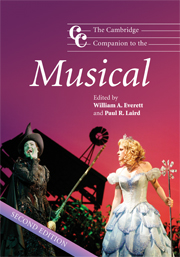Book contents
- Frontmatter
- Part I Adaptations and transformations: before 1940
- 1 American musical theatre before the twentieth century
- 2 Non-English-language musical theatre in the United States
- 3 Birth pangs, growing pains and sibling rivalry: musical theatre in New York, 1900–1920
- 4 American and British operetta in the 1920s: romance, nostalgia and adventure
- 5 Images of African Americans: African-American musical theatre, Show Boat and Porgy and Bess
- 6 The melody (and the words) linger on: American musical comedies of the 1920s and 1930s
- Part II Maturations and formulations: 1940–1970
- Part III Evolutions and integrations: after 1970
- Part IV Legacies and transformations
- Notes
- Select bibliography
- Index
3 - Birth pangs, growing pains and sibling rivalry: musical theatre in New York, 1900–1920
from Part I - Adaptations and transformations: before 1940
Published online by Cambridge University Press: 28 September 2011
- Frontmatter
- Part I Adaptations and transformations: before 1940
- 1 American musical theatre before the twentieth century
- 2 Non-English-language musical theatre in the United States
- 3 Birth pangs, growing pains and sibling rivalry: musical theatre in New York, 1900–1920
- 4 American and British operetta in the 1920s: romance, nostalgia and adventure
- 5 Images of African Americans: African-American musical theatre, Show Boat and Porgy and Bess
- 6 The melody (and the words) linger on: American musical comedies of the 1920s and 1930s
- Part II Maturations and formulations: 1940–1970
- Part III Evolutions and integrations: after 1970
- Part IV Legacies and transformations
- Notes
- Select bibliography
- Index
Summary
It has been a matter of regret with many music lovers that we have had so few really good comic operas during the past few years … the so-called comic opera stage has degenerated hopelessly of late.
Critics in every generation lament the dearth of good material on the Broad way musical stage, but these lines, published in Musical America in 1906, do not actually sound the death-knell of a genre. The first two decades of the twentieth century were a period of great foment during which producers, performers, librettists and composers grappled with the notion of a single genre that could combine the best of all worlds into a unified, coherent whole. The problem of varied and inconsistent terminology, implied in the phrase ‘so-called comic opera’, was a legacy from the nineteenth century that continued to plague critics in the early decades of the twentieth. Musically well-educated writers often adopted a highbrow stance and treated anything lighter than opera with disdain while other critics, reviewing the same work, might praise it as a cut above similar fare. Composers in the dawning century struggled to reconcile their inheritance with the evolution of a new and uniquely American art-form: what we now blithely call the Broadway Musical. Several things had to happen in order to establish the book show as the norm. Librettists had to create plots that chimed with the rhythms and concerns of contemporary experience; this eventually caused a shift from the politically tinged satires of Gilbert and Sullivan and Offenbach to the sentimental romances of Herbert and Romberg. Composers had to discard or integrate remnants of hand-me-down imported musical vocabularies into a language that embraced American vernacular idioms in song and dance.
- Type
- Chapter
- Information
- The Cambridge Companion to the Musical , pp. 54 - 71Publisher: Cambridge University PressPrint publication year: 2008
- 1
- Cited by



